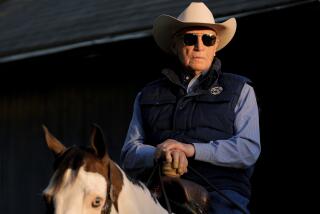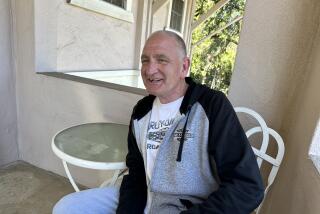Old Story: Athlete Discovers That Cocaine Holds the Reins on His Life
- Share via
As the agent for Chris Antley, Drew Mollica felt as close to the jockey as if he were a brother, and worried about him as if he were a father. He had attended counseling sessions when the rider was undergoing treatment for cocaine addiction last winter. He understood the magnitude of the danger that drugs posed for the 23-year-old. So Mollica immediately feared the worst when Antley didn’t show up at Belmont Park Saturday morning.
The jockey had been sidelined for a month because of an injury, interrupting a sensationally successful year and a dramatic comeback from his drug problems. Now he was ready to ride again, and he was scheduled to exercise two horses in the morning.
Mollica telephoned the jockey. Antley said he had overslept; he’d be there immediately. Mollica telephoned later. Antley said his car had run out of gas. Antley never showed up. When Mollica finally confronted him, the jockey said he had gone to a sun-tanning salon.
Cocaine had taken hold of him again.
Mollica regretfully called the New York Racing Association stewards and told them he was quitting as Antley’s agent. And Wednesday the state Racing and Wagering Board issued a statement saying Antley had “acknowledged that he has a substance-abuse problem” and had voluntarily surrendered his jockey’s license.
He will undergo treatment again, but this is not a case where an athlete will whiz through a 30-day program and promptly resume his career where he left off. It is by no means certain that Antley will ever be able to pick up the shattered pieces of his life and career. “This is a human tragedy,” said Mollica.
For five years Antley and Mollica had enjoyed a remarkable collaboration. The jockey was blessed with immense natural talent; the agent was a tireless hustler who learned every trick of the trade to find the best possible mounts. They dominated New Jersey so totally that Antley led the nation in winners in 1985. They moved to New York, where newcomers traditionally have a tough time breaking in, but Antley was the second-leading rider in his first season there. He was earning $600,000 a year, of which his agent got 25 percent.
Antley relished his success. He bought a big, white Mercedes 560SEC that symbolized his fondess for life in the fast lane, both literally and figuratively. Plenty of racing people resented his lifestyle -- Mollica had to mollify many trainers -- and none would have been surprised to learn Antley was involved with drugs.
“I started experimenting off and on with cocaine 2 1/2 years ago,” Antley said in the spring. “It never seemed to be a problem for me.” When he tested positive for cocaine last November, he was suspended and forced to enter a rehabilitation program, but he still talked as if he was a recreational drug user whose big mistake was getting caught.
Mollica was getting an education about drug addiction as Antley went through his treatment. “In the clinic and rehabiliation you learn you have to deal with the problem head on. You have to change your lifestyle and your environment completely and stay in the program, and if you don’t, it’s doom.”
Yet Antley maintained there was no major problem with which to deal and said, “I have no temptation whatosever to use cocaine,” as if that closed the issue.
For much of this year Antley rode as if he meant those words. He made national headlines for winning races on 64 consecutive days in New York. He was on his way to being the top race-winning rider in New York. Mollica hustled harder than ever to keep his jockey busy. But when the jockey tore some ligaments in a spill at Saratoga and was put on the sidelines, Mollica fretted, “Idle time is the devil’s workshop.”
When it became apparent last weekend that Antley couldn’t function as a jockey, Mollica ended their partnership with remorse and even a nagging sense of guilt: “I was always on his back. I was his antagonist, but in some senses I was his enabler -- that’s a drug word -- the guy who’d make his wrongs right. If he missed an appointment, I’d cover for him. If he was in trouble, I’d find his doctor. I love him like a brother. It’s more than business, because if it was just business I would have bailed out a long time ago. I wanted to linger in the hope that there was some sanity out there. I didn’t want to quit but I couldn’t live like that any more. I’ll find another rider. I’ll survive. But he’s got to pick up the pieces of his life.”
Mollica understands too that Antley’s fall is more than a personal tragedy. It is one that affects the whole sport and, in some senses, anybody battling a similar drug addiction. “When Dwight Gooden had his problems,” Mollica said, “I thought everybody should go out to Shea Stadium and boo him. But Chris’s doctor told me that was the wrong way to think, that when Gooden made it back it showed everybody that you could beat this thing. If Antley could beat it, then anybody could beat it.”
Antley had every reason to beat cocaine. He had the potential to be as good as any jockey in America, to be a national celebrity. He was going to make millions of dollars. He had already seen his brother self-destruct because of drugs. Yet with all these incentives, he succumbed, leading Drew Mollica to wonder, “Just what kind of monster is this that we’re fighting?”
More to Read
Go beyond the scoreboard
Get the latest on L.A.'s teams in the daily Sports Report newsletter.
You may occasionally receive promotional content from the Los Angeles Times.










